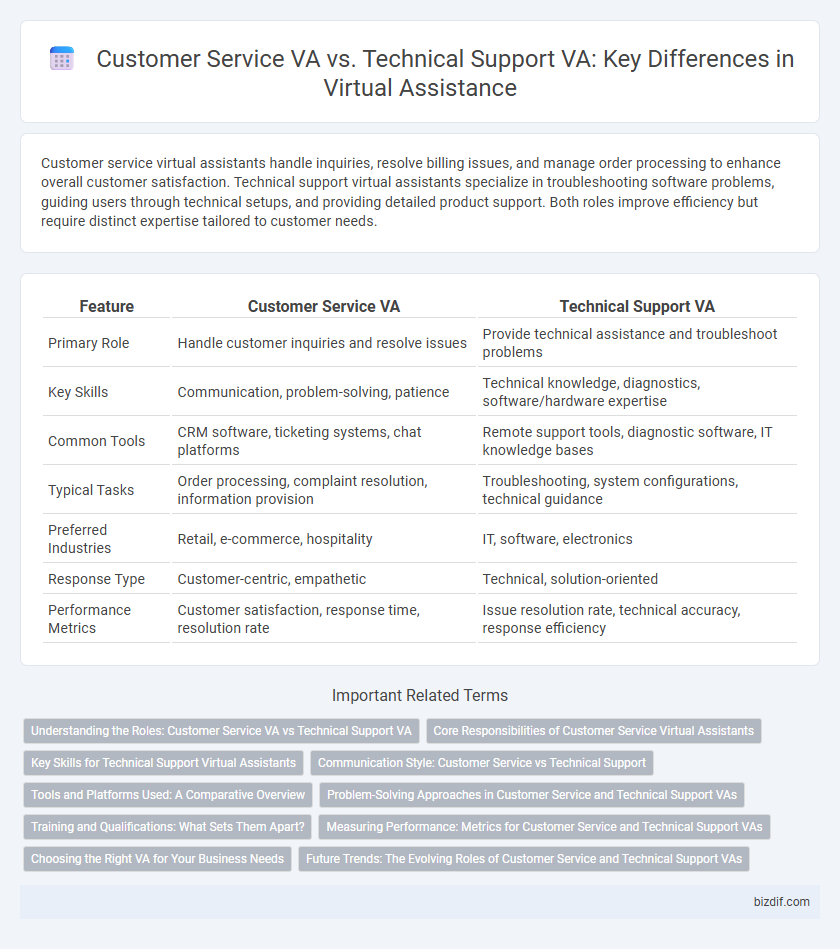Customer service virtual assistants handle inquiries, resolve billing issues, and manage order processing to enhance overall customer satisfaction. Technical support virtual assistants specialize in troubleshooting software problems, guiding users through technical setups, and providing detailed product support. Both roles improve efficiency but require distinct expertise tailored to customer needs.
Table of Comparison
| Feature | Customer Service VA | Technical Support VA |
|---|---|---|
| Primary Role | Handle customer inquiries and resolve issues | Provide technical assistance and troubleshoot problems |
| Key Skills | Communication, problem-solving, patience | Technical knowledge, diagnostics, software/hardware expertise |
| Common Tools | CRM software, ticketing systems, chat platforms | Remote support tools, diagnostic software, IT knowledge bases |
| Typical Tasks | Order processing, complaint resolution, information provision | Troubleshooting, system configurations, technical guidance |
| Preferred Industries | Retail, e-commerce, hospitality | IT, software, electronics |
| Response Type | Customer-centric, empathetic | Technical, solution-oriented |
| Performance Metrics | Customer satisfaction, response time, resolution rate | Issue resolution rate, technical accuracy, response efficiency |
Understanding the Roles: Customer Service VA vs Technical Support VA
Customer Service Virtual Assistants handle inquiries related to orders, billing, and general product information, ensuring smooth communication and customer satisfaction. Technical Support Virtual Assistants specialize in troubleshooting software, hardware issues, and providing product usage guidance, requiring deeper technical knowledge. Differentiating these roles helps businesses allocate tasks effectively and enhance operational efficiency.
Core Responsibilities of Customer Service Virtual Assistants
Customer service virtual assistants specialize in managing client interactions, handling inquiries, and resolving complaints through various communication channels to enhance customer satisfaction. Their core responsibilities include processing orders, providing product information, managing returns, and ensuring timely follow-ups to maintain positive customer relationships. These VAs prioritize empathetic communication and problem-solving skills to support brand loyalty and improve overall customer experience.
Key Skills for Technical Support Virtual Assistants
Technical Support Virtual Assistants excel in troubleshooting, software installation, and network diagnostics, requiring strong analytical skills and in-depth technical knowledge. Proficiency in customer relationship management (CRM) software and familiarity with multiple operating systems enhances their ability to resolve complex technical issues efficiently. Effective communication and problem-solving skills are crucial for translating technical language into user-friendly solutions, ensuring high customer satisfaction.
Communication Style: Customer Service vs Technical Support
Customer service virtual assistants utilize empathetic and conversational communication to build rapport and ensure customer satisfaction, often addressing general inquiries and billing issues. Technical support virtual assistants adopt a more precise and instructional communication style, focusing on troubleshooting and resolving complex technical problems. Both prioritize clarity, but customer service VAs emphasize patience and friendliness, while technical support VAs rely on technical accuracy and detail.
Tools and Platforms Used: A Comparative Overview
Customer service virtual assistants primarily utilize CRM platforms such as Salesforce and Zendesk to manage customer interactions and track service tickets efficiently. Technical support virtual assistants often rely on remote desktop tools like TeamViewer, diagnostic software, and IT service management platforms like ServiceNow to troubleshoot and resolve technical issues. Both types leverage AI-driven chatbots and communication channels like live chat, email, and VoIP to enhance real-time support delivery.
Problem-Solving Approaches in Customer Service and Technical Support VAs
Customer service virtual assistants utilize empathetic communication and active listening to resolve issues related to billing, account management, and general inquiries, ensuring customer satisfaction. Technical support virtual assistants employ diagnostic tools and troubleshooting algorithms to identify and fix software, hardware, or connectivity problems efficiently. Both VAs rely on machine learning and natural language processing to adapt and improve their problem-solving strategies over time.
Training and Qualifications: What Sets Them Apart?
Customer service virtual assistants require strong communication skills and training in handling diverse customer inquiries with empathy, while technical support virtual assistants need specialized knowledge in IT systems, software troubleshooting, and technical certifications. Customer service VAs often undergo training in conflict resolution and customer relationship management (CRM) tools. In contrast, technical support VAs are trained in diagnostic techniques, software installation, and hardware maintenance to efficiently resolve technical issues.
Measuring Performance: Metrics for Customer Service and Technical Support VAs
Customer service VAs are evaluated using metrics such as first response time, customer satisfaction score (CSAT), and resolution rate to ensure efficient and positive client interactions. Technical support VAs focus on measuring first call resolution, average handle time, and technical issue escalation rates to assess their problem-solving effectiveness and technical expertise. Tracking these specific KPIs enables organizations to optimize VA performance aligned with the distinct demands of customer service and technical support functions.
Choosing the Right VA for Your Business Needs
Selecting the right virtual assistant (VA) depends on your business priorities: Customer Service VAs specialize in handling inquiries, managing order processes, and ensuring positive client interactions to enhance satisfaction and retention. Technical Support VAs offer expertise in troubleshooting software issues, guiding users through complex problems, and maintaining system functionality to reduce downtime. Evaluating your business's operational demands and client expectations ensures you invest in a VA whose skills align with your service goals and technological requirements.
Future Trends: The Evolving Roles of Customer Service and Technical Support VAs
Customer service virtual assistants (VAs) are increasingly integrating AI-driven natural language processing to provide personalized, proactive support, enhancing customer satisfaction and retention. Technical support VAs are evolving with advanced diagnostic algorithms and machine learning to resolve complex issues faster and offer predictive maintenance solutions. The future trend indicates a convergence of these roles, where hybrid VAs will leverage AI to deliver seamless, end-to-end customer and technical support experiences across multiple digital channels.
Customer service VA vs Technical support VA Infographic

 bizdif.com
bizdif.com